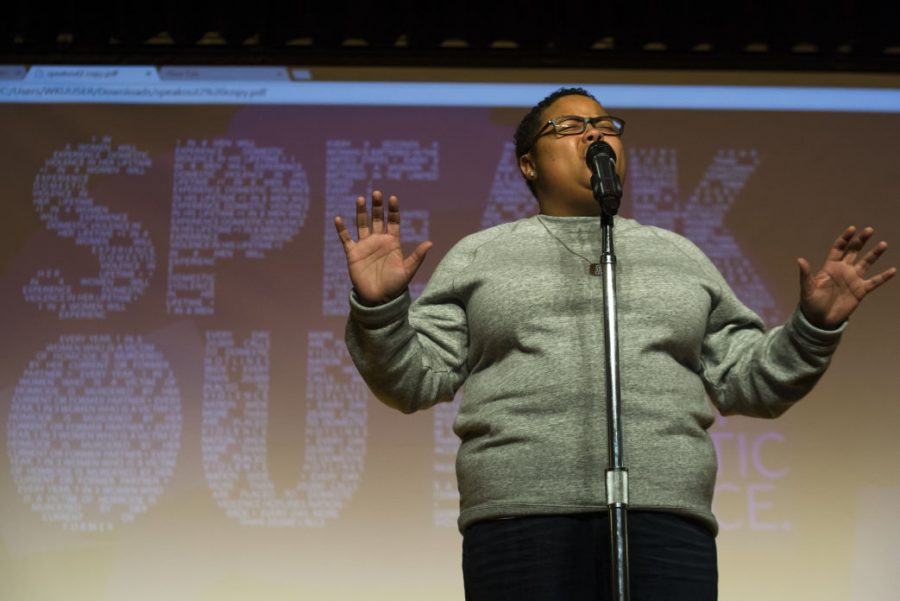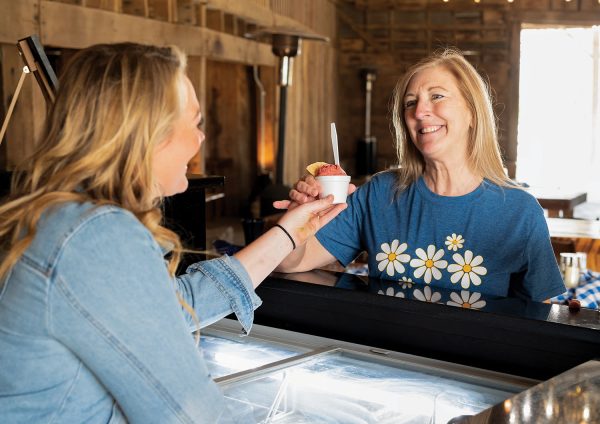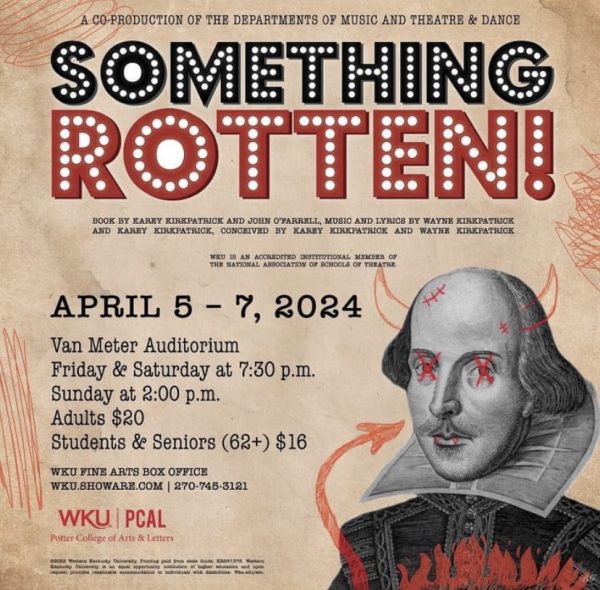Speak Out raises domestic violence awareness
October 16, 2014
Connie Kingrey-Knapp was a victim of domestic violence for more than a decade before escaping from her tormentor and his multiple attempts on her life.
She spoke about her experience on Tuesday night at Speak Out, an artistic conglomeration that focused on domestic violence awareness. Speak Out provided a platform for students, staff and local residents to express themselves on the subject of domestic violence.
The Barren River Area Safe Space, or BRASS, is a domestic violence agency based in Bowling Green that focuses on advocacy, emergency shelter and support for victims of domestic violence. They aided Kingrey-Knapp when she needed help.
Gordana Popovic, an employee of BRASS, also spoke at the event.
“I want students to take away some positives from this event,” Popovic said. “For example, having a healthy relationship and respecting one another. I also want students to know that BRASS is here to offer those help who are in violent relationships.”
Elizabeth Madariaga, sexual assault services coordinator for the Counseling and Testing Center, said this was the third year for Speak Out.
“I see students who are willing to stand up and speak out on the issue, and that in turn also helps other students speak out and seek help themselves,” she said.
She said Speak Out allows students to express themselves the way they need to and lets them have an option to do whatever it is they’re inspired to do. She said Speak Out is important because of the pressing need to identify and talk about the issue of domestic violence.
Earlier on Tuesday morning, President Gary Ransdell signed a proclamation declaring this October as National Domestic Violence Awareness Month.
Incidents of domestic violence have made headlines in the past couple of months, most notably with football player Ray Rice, who was caught on video punching his then fiancée in an elevator.
In 2012, the Centers for Disease Control and Prevention reported that, on average, 24 people every minute are victims of rape, physical violence, or stalking by an intimate partner in the United States.
Madariaga said communication for such topics is imperative.
“It’s important for us to be able to talk about events and to talk about situations like this and to talk about such sticky and uncomfortable issues, such as intimate partner violence,” she said.
Ransdell said he felt strongly about equal treatment for everyone on campus.
“Every individual on this campus is as important as any individual on this campus and we’re a campus family and that’s the way we treat each other and I simply cannot stay silent if I sense that any member of this campus community is being mistreated, let alone unwanted or unwelcome.”
When Kingrey-Knapp took to the stage at Speak Out, she recalled many of the horrific events that she suffered at the hand of her then-husband. She lived in fear that no one else could see because her abuse was not physical, but was verbal and sexual. She often said she survived a war and lived to talk about it.
“If one person in this room heard what I said and can help others because of it then that’s why I speak out,” Kingrey-Knapp said. “If I can change someone’s life for the rest of my life then I’m happy.”
Lauren Cunningham, community engagement coordinator for the ALIVE Center, served as the emcee for the event.
“Domestic violence is an ugly thing that is disguised as love,” Cunningham said.
Cunningham also reminded attendees how it can affect relationships with family and friends, work, social life and self-esteem.
Susan Harper, a Bowling Green graduate assistant in the Talley Family Counseling Center, got involved with Speak Out because her 18-year-old best friend was murdered by her boyfriend.
“I remember seeing her earlier the day of the incident and then I saw her in the hospital that night and then she was gone,” Harper said. “It’s one of the most traumatic things I’ve been through.”
Harper said that whether it’s a performer on stage or a member in the audience, participants get to see how real of an issue domestic violence is and how close to home it can really be.
Kingrey-Knapp encouraged people to report domestic violence.
“We don’t currently have a cure for cancer, but I believe we can cure domestic violence if more people will address it,” Kingrey-Knapp said.












![Students cheer for Senator at Large Jaden Marshall after being announced as the Intercultural Student Engagement Center Senator for the 24th Senate on Wednesday, April 17 in the Senate Chamber in DSU. Ive done everything in my power, Ive said it 100 times, to be for the students, Marshall said. So, not only to win, but to hear that reaction for me by the other students is just something that shows people actually care about me [and] really support me.](https://wkuherald.com/wp-content/uploads/2024/04/jadenmarshall-1200x844.jpg)






![Megan Inman of Tennessee cries after embracing Drag performer and transgender advocate Jasmine St. James at the 9th Annual WKU Housing and Residence Life Drag Show at Knicely Conference Center on April 4, 2024. “[The community] was so warm and welcoming when I came out, if it wasn’t for the queens I wouldn’t be here,” Inman said.](https://wkuherald.com/wp-content/uploads/2024/04/smith_von_drag_3-600x419.jpg)






